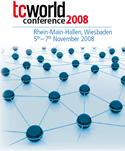Microsoft terminology management presented at tcworld 2008
 Last week I was in Wiesbaden (Germany) for the tcworld conference 2008, the world's largest event in the field of technical communication, to present Working with terminology at Microsoft: a case study.
Last week I was in Wiesbaden (Germany) for the tcworld conference 2008, the world's largest event in the field of technical communication, to present Working with terminology at Microsoft: a case study.
I gave an overview of the Microsoft terminology management model, describing how it evolved over the years from simple isolated glossaries to its current multilingual, centralized concept-oriented database.
I covered the roles and goals of English and target language terminologists in our team, Microsoft Language Excellence, and illustrated the terminology management workflow within the product development cycle. (Update: As of Jan 2009, Microsoft has moved to an outsource model for target language terminology work.)
I also described our terminology-related tools and concluded by illustrating our involvement with worldwide communities and, more specifically, initiatives like the Microsoft Language Portal and the Microsoft Terminology Community Forum.
Terminology was one of the main themes of the conference and there was great interest in the prominent role of terminology management in the life cycle of Microsoft products. It appears, in fact, that relatively few companies have developed terminology management systems, and in many cases language professionals only have basic terminology lists available to them.
As pointed out by several speakers at the conference, although the benefits of consistent corporate terminology on internal and external communication are well understood, it can be hard to convince corporate management that it is worth investing in terminology. Unsurprisingly, the lectures that focused on the ROI of terminology development attracted very attentive audiences.
At Microsoft, the current concept-oriented terminology approach has proven to have clear benefits in terms of efficiency, consistency, and quality, which are recognized by our management. The Language Excellence team will continue to improve its terminology management system and make terminology and best practices available to worldwide communities in the Microsoft Language Portal. We hope language professionals will find it useful not only for reference but also to help them promote the importance of terminology management in their own working environments.
Licia Corbolante, Italian terminologist
For additional information, see Terminology management at Microsoft and Terminology management methods in the localization process.